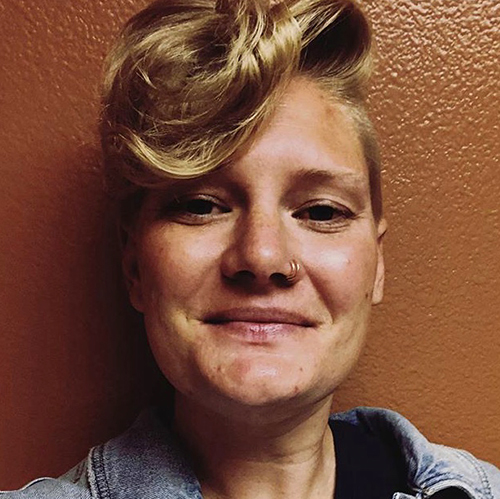
Hamza Makhchoune/Shutterstock
.
Times are unsettling for all of us these days. While it feels like in many ways we are experiencing this pandemic all together, the impact it has on each of us as individuals is extremely diverse. Through my work at Gender Spectrum I am seeing firsthand the impact COVID-19 is having on transgender and nonbinary youth, their families and the professionals in their lives.
As with all of us, the impact of the pandemic on trans and nonbinary youth varies from person to person. The experiences we are hearing from youth seem to be greatly impacted by the following factors: Does a young person have an affirming and supportive family at home related to their gender; do they have an affirming and safe school environment; do they have both of these things, one or neither?

Jenna Hackman
Some youth are grateful to be at home, where they are no longer in an unsafe and transphobic school environment. At home they get to be their true selves, often escaping things like navigating facilities including bathrooms, rigid gender norms; often presenting their gender in a way that feels true to them, and being addressed by their chosen name and pronouns. This creates an overall spaciousness to focus on other things outside of their gender in a safe home setting.
For others their school community is where they feel most held and seen. For some trans and nonbinary youth, being in isolation and sheltering in place means being trapped at home with family who do not use your correct pronouns, name or affirm your gender in the ways you most need it. Grieving the loss of a safe community at school is creating for many youth increased levels of gender dysphoria, self-harm, anxiety and other mental health concerns. Trans Lifeline, a hotline for transgender youth in crisis, reported a 77% increase in the number of calls in March and April.
Often in our work at Gender Spectrum we refer to a recent study by Stephen Russell that showed that using the chosen name of a transgender or nonbinary youth at work, school, with friends or at home can reduce depression symptoms by 71%. During COVID-19 this begs the question of how youth who can no longer access these critical spaces that provide that support and validation are doing.
The other key area of impact for many trans and nonbinary youth has been access to medical care. Many youth are grieving the postponement of long-awaited gender affirming surgeries and medical support. While many of these procedures are only on hold, the waiting game and not knowing when they will happen is extremely distressing.
Summer is a critical time for many medical procedures within the community because the time off from school allows for needed recovery. Needless to say, no matter what the circumstances are there is no doubt COVID-19 is impacting transgender and nonbinary youth in really sigificant ways.
How You Can Help
While the experiences trans and nonbinary youth are navigating are really difficult, support from others including friends, family, community and professionals can make a significant difference. According to a national Trevor Project survey, LGBTQ youth who report having at least one accepting adult were 40% less likely to report a suicide attempt.
You can help trans and nonbinary youth by expanding your understanding of gender to be able to providing safe and affirming spaces for them. As a parent, professional or friend you can be that person who uses the correct pronouns or addresses someone by their chosen name. While these acts might seem small to you they can go a long way.
In some ways at Gender Spectrum we feel like we’ve been preparing for this pandemic for the past four years. During this time we’ve been building up a robust Online Programming Department, offering some of the only online support groups for transgender and gender expansive preteens and teens, and their parents. We also offer online webinars, educational opportunities and online resources for all of us to expand our understanding of gender.
This access to community, particularly for young people, is really crucial right now as many youth who were already navigating aspects of isolation are feeling it more intensely. During the pandemic we have seen our online groups for youth increase by three times the typical attendance.
If you are a youth provider in some capacity such as a social worker, teacher, therapist or medical provider, the chances are pretty good you have worked with a trans or nonbinary young person wheather you knew it or not. During these difficult times it’s so critical that we all build our capacity and learn how to create more gender-inclusive and affirming environments for the young people in our spaces. Even just sharing resources like the ones we offer at Gender Spectrum might be the affirming support a young person needs.
For professionals we encourage you to check out Gender Spectrum’s resources including our Online Virtual Professional Development offerings during this time. We are also actively updating our COVID-19 Resource Guide for tailored resources and support.
Trans and nonbinary youth need us now more than ever. While we don’t know exactly what the future holds as we all navigate COVID-19, it’s never too late to start expanding our ideas of gender and supporting the youth in our lives. As I frequently say, I strongly believe gender should unleash the possibilities in every child instead of limiting them. It’s up to us as adults to create those expansive and affirming spaces so every young person can thrive.
Jenna Hackman (they/she) has been working at Gender Spectrum for the past four years as the director of online programming. As a queer and nonbinary person they feel grateful to be able to provide critical access to community and support for gender expansive youth.































